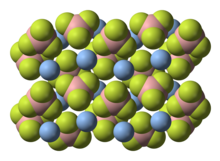സിൽവർ ടെട്രാഫ്ളൂറോബോറേറ്റ്
ദൃശ്യരൂപം

| |

| |
| Names | |
|---|---|
| IUPAC name
Silver tetrafluoridoborate(1–)
| |
| Other names
Borate(1-), tetrafluoro-, silver(1+)
| |
| Identifiers | |
3D model (JSmol)
|
|
| ChemSpider | |
| ECHA InfoCard | 100.034.491 |
| EC Number |
|
PubChem CID
|
|
| RTECS number |
|
CompTox Dashboard (EPA)
|
|
| InChI | |
| SMILES | |
| Properties | |
| AgBF4 | |
| Molar mass | 194.673 g/mol |
| Appearance | Off-white powder |
| Odor | almost odorless |
| സാന്ദ്രത | 0.936 g/cm3 |
| ദ്രവണാങ്കം | |
| soluble | |
| Hazards | |
| NFPA 704 (fire diamond) | |
| Safety data sheet (SDS) | External MSDS |
Except where otherwise noted, data are given for materials in their standard state (at 25 °C [77 °F], 100 kPa).
| |
AgBF4 എന്ന രാസ സൂത്രവാക്യത്തോടുകൂടിയ ഒരു അജൈവ സംയുക്തമാണ് സിൽവർ ടെട്രാഫ്ളൂറോബോറേറ്റ് . ധ്രുവീയ ജൈവ ലായകങ്ങളിലും വെള്ളത്തിലും ലയിക്കുന്ന ഒരു വെളുത്ത ഖരമാണിത്. അതിന്റെ ദൃഡീയമായ അവസ്ഥയിൽ, Ag + കേന്ദ്രങ്ങൾ ഫ്ലൂറൈഡുമായി ബന്ധപ്പെട്ടിരിക്കുന്നു. [1]
തയ്യാറാക്കൽ
[തിരുത്തുക]ബോറോൺ ട്രൈഫ്ലൂറൈഡ് സിൽവർ ഓക്സൈഡ് എന്നിവ ബെൻസീൻ സാന്നിദ്ധ്യത്തിൽ രാസപ്രവർത്തനം നടത്തി സിൽവർ ടെട്രാഫ്ളൂറോബോറേറ്റ് നിർമ്മമിക്കുന്നു.
ലബോറട്ടറി ഉപയോഗങ്ങൾ
[തിരുത്തുക]അജൈവ, ഓർഗാനോമെറ്റാലിക് കെമിസ്ട്രി ലബോറട്ടറിയിൽ, സിൽവർ ടെട്രാഫ്ളൂറോബോറേറ്റ് (ചിലപ്പോൾ "സിൽവർ ബിഎഫ് -4" എന്ന് വിളിക്കപ്പെടുന്നു), ഉപയോഗപ്രദമായ ഒരു അഭികാരകമാണ് . ഡിക്ലോറോമെഥെയ്നിൽ, സിൽവർ ടെട്രാഫ്ളൂറോബോറേറ്റ് ശക്തമായ ഒരു ഓക്സിഡന്റാണ്. [2]
അവലംബം
[തിരുത്തുക]- ↑ Evgeny Goreshnik, Zoran Mazej, "X-ray single crystal structure and vibrational spectra of AgBF4" Solid State Sciences 2005, Volume 7, pp. 1225–1229. doi:10.1016/j.solidstatesciences.2005.06.007
- ↑ N. G. Connelly, W. E. Geiger (1996). "Chemical Redox Agents for Organometallic Chemistry". Chemical Reviews. 96 (2): 877–910. doi:10.1021/cr940053x. PMID 11848774.

